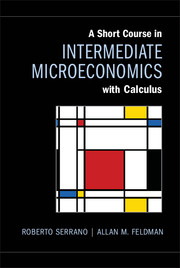15 - An Exchange Economy
from Part IV - General Equilibrium Analysis
Summary
Introduction
What economists call a pure exchange economy, or more simply an exchange economy, is a model of an economy with no production. Goods have already been produced, found, inherited, or endowed, and the only issue is how they should be distributed and consumed. Even though this model abstracts from production decisions, it illustrates important questions about the efficiency or inefficiency of allocations of goods among consumers, and provides important answers to those questions.
In this chapter, we start with a very simple model of an exchange economy, and we will discuss Pareto optimality or Pareto efficiency for allocations of goods among consumers. Then we turn to the role of markets, and discuss market or competitive equilibrium allocations. Finally, we discuss the extremely important connections between markets and efficiency in an exchange economy. These connections between markets and efficiency are among the most important results in economic theory, and are appropriately called the fundamental theorems of welfare economics.
An Economy with Two Consumers and Two Goods
We will study the simplest possible exchange economy model, with only two consumers and two goods. A model of exchange cannot get much simpler, because if there were only one good or one person, there would be no reason for trade. However, even though our model is extremely simple, it captures all the important issues, and it generalizes easily.
Let us suppose that there are two consumers. In recognition of Daniel Defoe's early novel Robinson Crusoe (published in 1719), we call them Robinson and Friday.
- Type
- Chapter
- Information
- A Short Course in Intermediate Microeconomics with Calculus , pp. 263 - 283Publisher: Cambridge University PressPrint publication year: 2012



